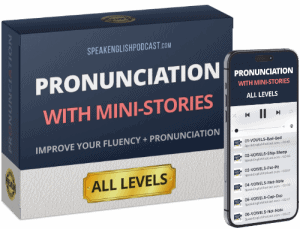Get my Pronunciation Course!
Transcript:
Hi! I’m Georgiana, and I’m back with a new episode of the Speak English Now podcast—the podcast that helps you speak English fluently, with no grammar and no textbooks.
This is the fourth and final episode in our pronunciation series. In the first episode, we practiced R and L. In the second, we worked on the TH sound. In the third, we practiced V and B. And today, we will practice the difference between SH and CH.
These sounds look similar, but they are not the same. For example: ship and chip.
So let’s practice with some minimal pairs, some fun tongue twisters, and finally a mini-story.
Quick Word-Pair Drills (listen & repeat)
Say each pair 3 times: slow → medium → fast.
ship – chip
shop – chop
sheep – cheap
shore – chore
cash – catch
lash – latch
mash – match
rash – ratchet
washer – watcher
wishing – witching
Word Pairs in Sentences
ship – chip
The ship carries a chip.
shop – chop
They shop before they chop vegetables.
sheep – cheap
The sheep is not cheap.
shore – chore
The shore is beautiful, but the chore is boring.
cash – catch
He will catch the cash.
lash – latch
The lash hit the latch.
mash – match
They mash the food before the match.
rash – ratchet
The rash appeared near the ratchet.
washer – watcher
The washer made noise, but the watcher stayed calm.
wishing – witching
She was wishing during the witching hour.
Tongue Twister Practice
Repeat slowly after me. Then try faster and faster.
- She sells chips on the ship.
- Cheap sheep sleep.
- Charlie chops cheap cheese.
- Sheila ships shiny shoes.
- She should choose cheap chips for the ship.
- Chubby children chew chewy chocolate on the shore.
- Shy Charlie shouted sharply at the cheerful chef.
If you want to practice more, get my
Pronunciation Course
Mini-Story
(Practice Speaking)
I’ll tell you a short story, then I’ll ask you questions. After each question, you’ll answer out loud. Then I’ll confirm the correct answer. This helps you think in English and improve your speaking.
Let’s start!
Mark was traveling. He wanted a cheap hotel.
Who was traveling?
Mark. Mark was traveling.
What did he want?
A cheap hotel. He wanted a cheap hotel.
Did he want an expensive hotel or a cheap hotel?
A cheap hotel. He wanted a cheap hotel.
But Mark pronounced it wrong. He said ‘sheep hotel’ instead of ‘cheap hotel.’
Did Mark pronounce it correctly?
No. He did not pronounce it correctly.
What did he say instead of cheap?
Sheep. He said sheep.
Did he ask for a cheap hotel or a sheep hotel?
A sheep hotel. He asked for a sheep hotel.
The receptionist was confused. She asked, “A sheep hotel? Do you mean a hotel for sheep?”
Was the receptionist confused or calm?
Confused. She was confused.
What strange question did she ask?
She asked, “Do you mean a hotel for sheep?”
Did she think Mark wanted a sheep hotel or a cheap hotel?
A sheep hotel. She thought he wanted a sheep hotel.
Mark shook his head and repeated: “Cheap hotel, please.”
Did Mark agree or shake his head?
He shook his head.
What did he repeat, sheep or cheap?
Cheap. He repeated cheap.
Still, the receptionist wanted to be sure. She asked, “Do you mean a cheap hotel or a ship hotel near the port?”
Where was the ship hotel?
Near the port. The ship hotel was near the port.
Did Mark want a hotel for ships or a cheap hotel for people?
A cheap hotel for people. He wanted a cheap hotel for people.
Mark laughed and pointed to the price list. He said, “Cheap! I want the cheap hotel, not a ship and not sheep.”
Did Mark laugh or cry?
He laughed. Mark laughed.
What did he point to?
The price list. He pointed to the price list.
What three words did he contrast, sheep, ship, and cheap or cat, dog, and bird?
Sheep, ship, and cheap. He contrasted sheep, ship, and cheap.
Finally, the receptionist understood. She smiled and gave him the key to a cheap hotel room.
Did the receptionist finally understand?
Yes. She finally understood.
What did she give Mark?
A key. She gave him a key.
Was it for a sheep hotel, a ship hotel, or a cheap hotel?
A cheap hotel. It was for a cheap hotel.
Mark went to his room and thought, “Next time I will practice SH and CH before I travel.”
What did Mark do at the end, smile or frown?
Smile. He smiled.
What sounds did he want to practice, grammar or SH and CH?
SH and CH. He wanted to practice SH and CH.
When did he want to practice, before or after traveling?
Before. He wanted to practice before traveling.
Great job! Today you practiced the difference between SH and CH with minimal pairs, example sentences, tongue twisters, and a mini-story.
This was the final episode in our pronunciation series. We practiced R and L, TH, V and B, and finally SH and CH.
If you enjoyed these lessons, remember that I also have a complete pronunciation course with many more stories and exercises to help you sound clearer and more confident.
Keep practicing every day, and remember: clarity first, speed second.
That is the end of this 4-part pronunciation series. See you in the next episode!
If you want to practice more, get my
Pronunciation Course
Get my Pronunciation Course!


0 Comments